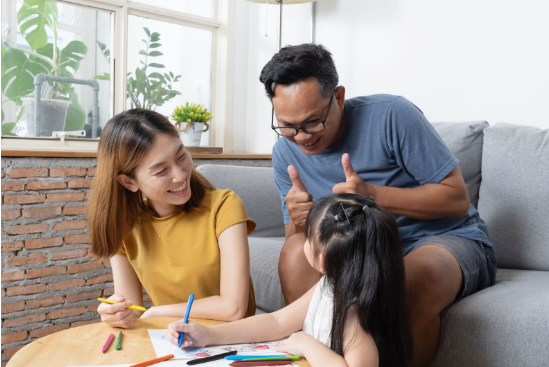Source: Senior Parenting Expert, Bally
How can we know if we are competent parents? We can find out how the children get along with their parents and how they behave by observing them, and here are five things we can observe.
First, trust the parents. If a child trusts their parents, we can see it in their eyes and in their responses when they communicate with their parent. When a parent talks to a child, the child looks intently at the parent, understands what the parent is saying, and responds clearly with “Yes! I understand,” and then follows instructions. This means that parents usually have good communication with their children.
Parents often tell their children why they should do something, whether it is a good thing to do, or what they think of it. For example, “I think you did a good job when a child fell down and you walked over to pick him up right away.” When parents tell their children how they feel and praise them for doing the right thing, they will be more willing to listen to their parents’ feelings and reactions, and they will gradually build trust.
Second, be brave enough to tell your parents. If children are willing to tell their parents when they encounter certain situations, it proves that their parents give them a lot of space. They are not afraid of being scolded by their parents, and they believe that their parents will give them the right direction, teach them what to do, and accept their wrongdoing. Therefore, children will slowly do what their parents think is right under the safety net. Communication between parents and children is very important, and we need to give them confidence in order to build a harmonious relationship. No matter what happens to them, it is very important that they are brave enough to share with their parents what has just happened or how they feel.
Third, have self-confidence. How can we tell that a child is confident? If a child looks at his or her parents before doing something and gets a positive look from them before doing it, in this case, the child is obviously not confident enough because he does not know what is right and what is wrong.
When a child can do something confidently in different situations, the parents can see that they can first give affirmation and then slowly tell him whether it is actually right or wrong to do what he just did, which over time will build the child’s confidence. They will know that they do not always have to do something right, as long as they have confidence, they can try to do it first. We will slowly build children’s self-confidence by reminding them of this process.
Fourth, have empathy. If children have empathy in many cases, for example, when they see a child fall, they will go to help the child; when they see an old woman crossing the street, they will want to help her. The fact that he is so empathic indicates that his parents, who are a competent pair of parents, have brought this message to him in their daily lives.
Because our future education hopes that children will not only take care of themselves but also care for society and pay attention to everything in society, empathy is very important. If children are able to take care of themselves and other people around them in their daily lives, it is important to be empathetic. So parents better pay attention to their own way of dealing with children, because if we have empathy, children will naturally have empathy.
Fifth, the ability to take care of themselves children are capable of taking care of themselves, such as eating, dressing, putting on shoes, etc. This also means that their parents are really competent at their jobs because they have taught them “how to fish, not fish for them.” As parents, we should teach our children that they are capable of coping with their own daily lives. If a child does not learn to put on his or her own school uniform by the end of K2, he or she will lose self-confidence over time and have a tendency to become dependent, gradually losing the ability to take care of himself or herself. It is important to be a competent parent to teach children to take care of their own lives.





